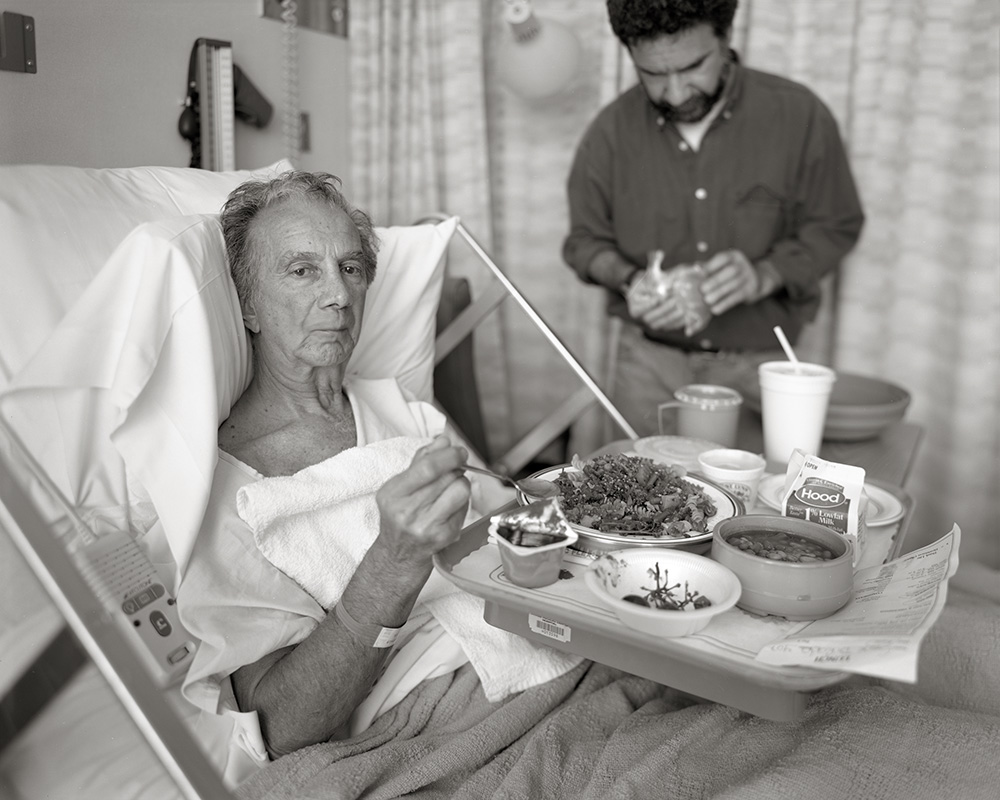Last Updated on 12/18/2018 by Mark Beckenbach
No matter the topic of our photography project, there’s always a personal affiliation with it. It becomes even more personal when it is centered around the people we love the most.
“…to answer your question, there was no real separation, this was and is how I function,” says Stephen DiRado about documenting his father’s battle with Alzheimer’s Disease. Stephen has been taking photographs since he was 12 years old. From early on, his friends and family became accustomed to him pointing a camera in their faces. The camera was the bridge that brought him closer to those around him. In the late 1980s his father’s (Gene) health became the focus of his lens. Although it was first thought to be depression, Gene was diagnosed with Alzheimer’s disease.
Until Gene’s death in 2009, Stephen visually documented his journey with the illness. We caught up with him to explore the impact the process had on him and their relationship.
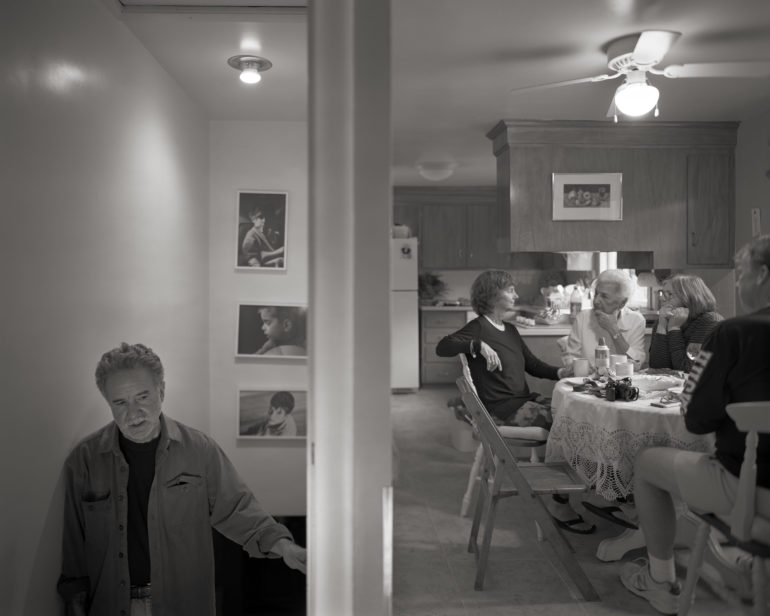
Phoblographer: How soon after realizing Gene was having difficulties with his health did you decide that you were going to visually document it?
Stephen: Officially I made it my assignment to document Gene by 1993 when I knew something really was horribly wrong with him. Long before that in 1987 I knew something was up, possibly depression. I did document him but only casually for the most part.
Phoblographer: Because of the personal element, did you have any doubts about doing the work? And what pushed you to overcome them?
Stephen: I am filled with anxiety issues, always have been since I was a teen. My driving force to photograph is one out of fear. Fear of people, fear of failing, fear of death – thus always working to succeed. I survive by pushing through personal issues making my art through photography all the time–thus less time to ponder the thoughts that would bring on panic attacks, paralyzing me many times over in a day.
I had visions of my father in his later years helping me with my career. Since he was an artist himself and mentored me all of my youth. I was hoping this would be the case. Instead I saw his illness advancing, instead of running away or shutting down emotionally, I ran towards him with my camera. It was my way of holding onto him. Sadly it was also a way through the resulting stills to see what was wrong.
“I am filled with anxiety issues, always have been since I was a teen. My driving force to photograph is one out of fear. Fear of people, fear of failing, fear of death – thus always working to succeed.”
Scrutinizing a photo in my hand of Dad was sobering. I could inspect it and see what might be really happening with him. When I realized there was no return, most likely having Alzheimer’s, my mission to document him became far more complex. When I was by his side in the hospital, I asked him if he could count to 10. He laughed, thought this to be a ridiculous question. He couldn’t find the words after number 7. This made me work even harder after this point in order to hold back the fear and depression that was knocking on my door.
Phoblographer: How did your experience differ compared to other photography projects you have worked on?
Stephen: Some of my projects have a beginning middle and end. Bell Pond, documents of a community was a one summer season back in 1983—enough photos, 1000 negatives shot on a large format camera to complete the essay. Same with the Mall Series; documents of mall habitat, 3700 negatives, also using a large format camera. In this case two and a half years was enough to get this job done – concluding with a museum exhibition. Dinner Series is running well over 30 years, but it changes, morphs into other explorations dealing with the same subject.
With Dad, documents of my father was a wild card. I slowly became aware I was working on a photography project. Once I identified the disease my father was succumbing to, I knew it was not going to end well. But I knew how important, maybe beyond anything else in my life, it would be to show others the horrors of this disease. I had to believe this in my heart.
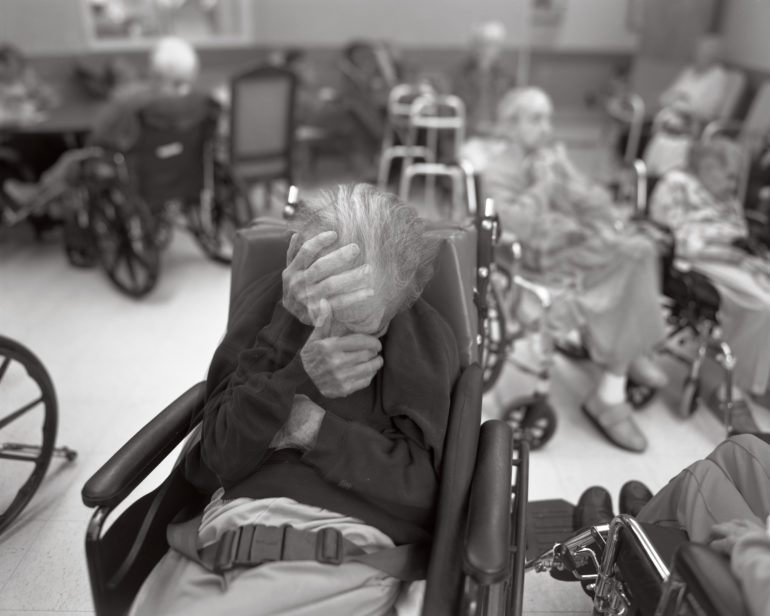
Phoblographer: Whilst Gene was living with Alzheimer’s’ you had two roles – Photographer and Son. Was it difficult to separate the two?
Stephen: Strange as it sounds, I was never without a camera by my side. When I was not engaged, talking, chit chatting along with family, I was quiet, feeling almost invisible whilst documenting them. It was simply accepted by all. The last four decades, my 8”x10” camera or small subcompact digital camera by my side, ready to capture a moment.
“With Dad, documents of my father was a wild card. I slowly became aware I was working on a photography project. Once I identified the disease my father was succumbing to, I knew it was not going to end well.”
So, to answer your question, there was no real separation, this was and is how I function. My mother, sister and brother and I all took turns washing, dressing and feeding Gene. It wasn’t much for me at a moment’s notice to silently bring a camera into a situation, focus and click away. Nobody ever questioned my intentions. With love, they simply just accepted it.
Phoblographer: Gene’s health declined over the years. Did this force you to make any changes in the way you approached photographing him?
Stephen: Yes, when he slowed down so did I. Some days I would just watch him for hours—eventually making just one photo. Rhetorically I’d say at one point, “Dad what will today’s photograph express?” Odd days there would be no answer thus no photograph taken. The last 2 years of his life, he was hardly aware of the camera. When attempting to make long one second exposures I had to anticipate that he was not going to involuntarily move. The words “HOLD STILL” meant nothing to him anymore. I worked in silence. Hugging him after a sheet was exposed.
Phoblographer: Is there a particular image from the collection that you feel really represents what you were trying to achieve?
Stephen: On my website, November 13, 2005, where you see me standing over my father in the nursing home, dressed like him, my hand on his face; it says it all. I am fully aware that I am my father’s son in so many ways. I am 30 years younger, holding onto him, together but a million years apart. A very sad moment in my life.
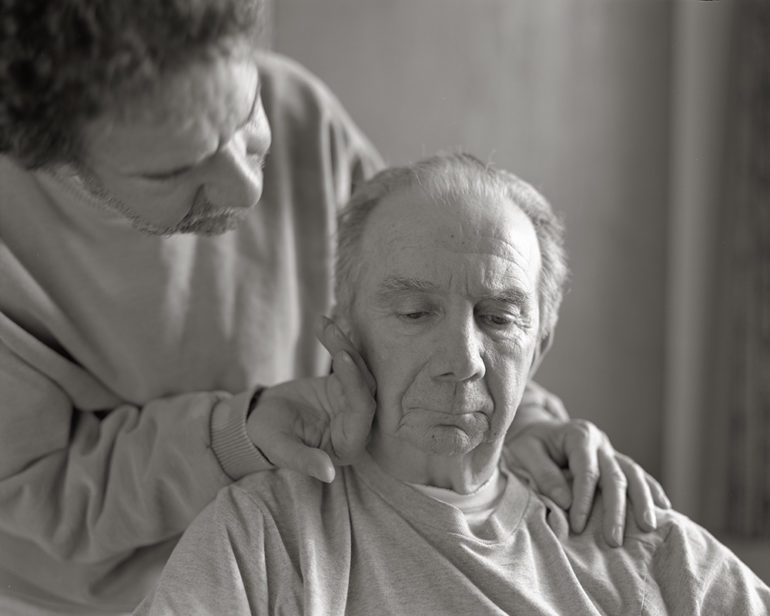
Phoblographer: Your work started at a time when Alzheimer’s was still largely unheard of. Through your intimate experience, what advice would you give to families today that are going through the same struggle?
Stephen: There is no doubt it is incredibly hard to see a loved one slowly slip away. Simply be present for them. Keep them active, and learn to laugh about the most stupid things that will come about. Laughing brings on laughter from all. It gets you through the darkest times. Also touching is incredibly important, hugging, caressing, singing—having music play in the background is an incredible stimulant. Not so much TV, it is too complex. Food is not much of a factor anymore, but smells, sunlight, rain or snow on a face has feeling. Having pets around also is stimulating. Near my father’s end, he wanted to eat my dog, motioning with his mouth to chomp on him. I laughed, he stopped and laughed. You have to roll with it. I am an artist, I made my care and visits my job. Making ones gatherings have purpose is survival for all.
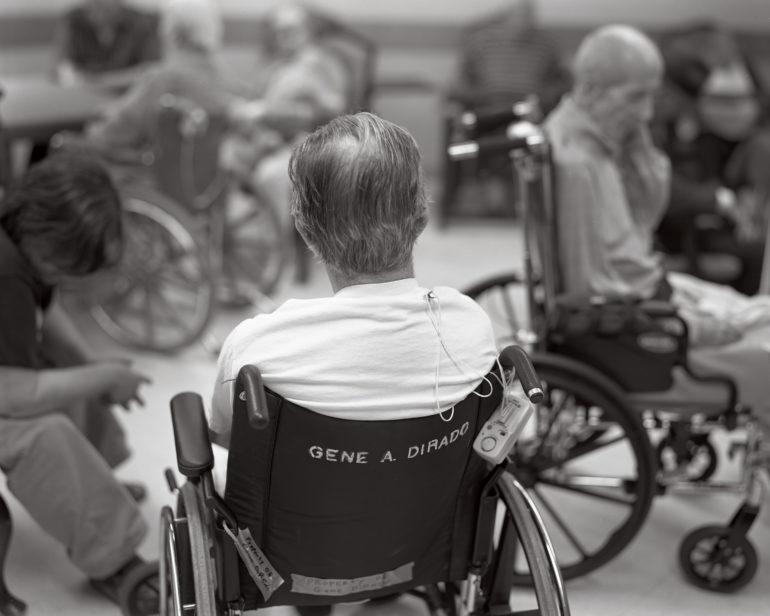
Phoblographer: Gene sadly passed in 2009. Almost 10 years on, when you look at the work, what do you think and feel?
Stephen: I was always proud of this work. It sat dormant in boxes, thousands of negatives with hundreds of prints, labelled and dated. It took documenting my mother coming home full time to stay in the house my father built and family grew up in for me to see closure. By adding documents of my mother, it made everything from the past seem less terminally sad. My mother is very active, she is 86 soon to be 87. She has purpose in life. That means the world to me and gives me the courage to show the world our past.
We would like to thank Stephen for taking the time to speak with us so openly and personally. You can see the full body of work from With Dad on Stephen’s website
All images were used with full permission.
Dan Ginn is a UK based street photographer and writer. Learn more about him via his website and Instagram.


